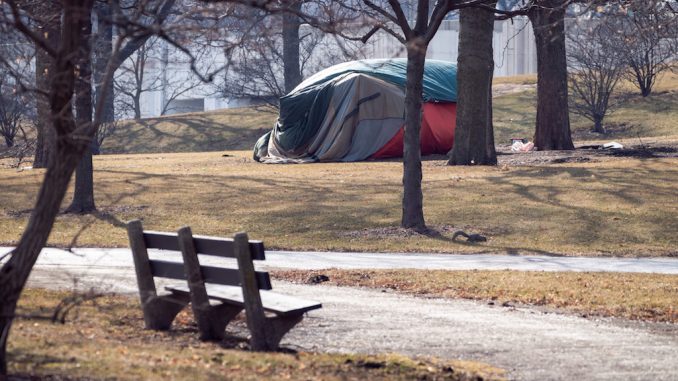
From the Wellesley Institute. Read the source study here

The number of people living in encampments across the province has been growing in recent years. At least 1,400 encampments were reported across Ontario in 2023. The growth demonstrates how current social and economic policy is failing more and more people.
The Association of Municipalities of Ontario, Ontario’s Big City mayors and numerous councillors have responded by asking for a comprehensive strategy to address crises in homelessness, mental health and addictions.
But alternatives to this thoughtful approach seem to be gaining ground.
Fifteen Ontario mayors are encouraging the Premier to invoke the notwithstanding clause of the Canadian Charter of Rights and Freedoms to enable encampments across the province to be cleared. They endorse bypassing Charter Rights to liberty and security of the person, and they are requesting that a new provincial offence be created for “repetitive acts of trespass” with the possibility of incarceration as a penalty, as well as the ability to force involuntary drug rehabilitation and mental health treatment.
This request for what they call a “timely and effective way” to manage encampments may temporarily remove homeless people from sight, but it will not reduce homelessness and it will have negative health impacts.
Forced displacement removes residents from social networks and local resources within and around encampments that they rely on to maintain their health and well-being. And without anywhere else to go, evidence shows people simply move in smaller numbers to other outdoor spaces with poorer access to safe housing and other supports.
The proposal would create further inequities amidst the affordability, housing and mental health crises. Black and Indigenous people and 2SLGBTQ+ youth are among those most vulnerable to outdoor homelessness. This is, in part, because they face unique barriers to accessing shelters and mental health supports.
Research has consistently disproved the effectiveness of involuntary treatment for mental health and addictions. It does not reduce homelessness in the long-term and it may increase the risk of overdose deaths.
Recent case studies highlighting how five Canadian cities responded to encampments during the height of the COVID-19 pandemic show forced removal led to injuries among residents, was expensive, and failed to connect them with housing and the wraparound services they needed.
We need equity-based solutions to end homelessness; solutions that address the real issues. A body of research already points the way.
Immediately housing people while providing health-promoting services shows the most promise for reducing homelessness while improving, not diminishing, health. Recovery-oriented approaches like Housing First have been shown to increase housing stability because they aim to move people into permanent housing as quickly as possible and then provide them with additional supports as needed. It’s an approach that has been proven to lower costs for homelessness, health and social supports. Community-based services that enable people experiencing homelessness to make their own choices, address their daily needs and connect them with supportive housing have led to improved health outcomes.
It’s time to start the hard work on homelessness. As winter descends, municipal plans to support those living outdoors continue to fall short.
We must, and can, guarantee everyone in Ontario has the housing they need to be in good health.
Homelessness is not and should never be a reason for incarceration. It’s a failure to action long-term policy solutions. Forced removal of people from encampments without a healthier place for them to go to should never be an option in Ontario.
Categories: HousingTags: encampments, homelessness, nothwithstanding clause

Mauriene Tolentino
Mauriene Tolentino (they/them) is a researcher and community organizer based in Scarborough/Williams Treaties. Their research is focused on mental health, public health policy, and access to health among racialized, migrant, and/or LGBTQ2S+ communities. Mauriene holds a Master of Public Health from the Dalla Lana School of Public Health with a specialization in Women and Gender Studies and Public Health Policy. Prior to joining Wellesley Institute, they led and worked on programming, research and policy analyses supporting access to rights and health for migrant and undocumented people, racialized Scarborough residents and LGBTQ2S+ communities in Tkaronto. maurienejean

Judy Noordermeer
Judy Noordermeer is a marketing and communications leader with more than 25 years of experience developing innovative communications and marketing strategies that drive social impact. She has worked for high-profile employers in the non-profit health, research, academic and social service sectors including the University of Toronto, Canadian Cancer Society, SickKids and Ronald McDonald House Charities Toronto. Her track record in branding, corporate communications, digital marketing, media relations, fundraising, event planning and internal communications have earned her more than 10 national and international awards. She serves on the Board of Directors of Research Canada, a national alliance for health discovery, and 8 80 Cities, a non-profit organization bringing citizens together to enhance mobility and public spaces. Judy holds a Master of Arts in Journalism from Western University and an Honours Bachelor of Arts degree in Sociology, with a minor in Peace and Conflict Studies, from the University of Waterloo.
Leave a Reply
You must be logged in to post a comment.